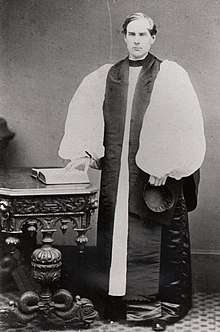Collinson Sawyer
William Collinson Sawyer[1] (1831 – 15 March 1868) was a colonial Anglican bishop in the third quarter of the nineteenth century.
William Collinson Sawyer | |
|---|---|
 William Collinson Sawyer | |
| Born | 30 August 1831 |
| Died | 15 March 1868 (aged 36) |
Education
He was born in 1831 and educated at Abingdon School, from 1845-1850 [2] and Oriel College, Oxford.[3]
Career
After some years as the Vicar of Tunbridge Wells,[4] he was appointed the inaugural Bishop of Grafton and Armidale[5] on 30 January 1867, consecrated on 2 February 1867 and died by drowning[6] when his boat was upset[7] in the Clarence River on Sunday 15 March 1868.
Whilst his status upon consecration was Bishop-Designate for the Diocese of Grafton and Armidale, he was never formally enthroned in his Cathedral-Designate: St Peter's Armidale due to his drowning in the Clarence River prior to his formal enthronement. His episcopal status therefore remained forever as a Suffragan Bishop in the Diocese of Newcastle.
The Act of the NSW Legislative Council 41st Victoria 1877 at page 23 inter alia contains the following:
"And whereas the Lord Archbishop of Canterbury having obtained Her Majesty's license or mandate by warrant under the Royal sign manual and signet did on the twenty-fourth day of February one thousand eight hundred and sixty-nine with other Bishops of the Church of England assisting him consecrate the Right Reverend James Francis Turner Doctor in Divinity with the intent and for the purpose that the said Bishop should exercise his functions in the said new see or diocese of Grafton and Armidale."
This Act passim makes no reference to William Collinson Sawyer as being a Bishop of Grafton and Armidale, clearly indicating that he never legally became Bishop of Grafton and Armidale.
James Francis Turner was formally enthroned in St Peter's Armidale on 10 September 1869, legally constituting him as the first Bishop of Grafton and Armidale.
See also
References
- British History on-lione
- "Register". Abingdon School.
- National Archives
- ”The Letters of Charles Dickens, Vol XI” Brown, MHouse, M/Storey, G/Tillotson, K: Oxford Clarendon, 1982 ISBN 0-19-812295-0
- Grafton Cathedral web-site
- State Library of NSW
- Illustrated London News, 1868
| Religious titles | ||
|---|---|---|
| New diocese | Bishop of Grafton and Armidale 1867– 1868 |
Succeeded by James Turner |